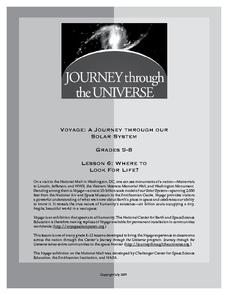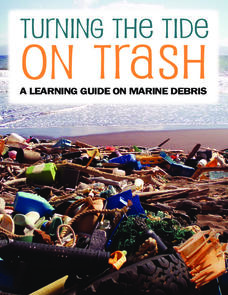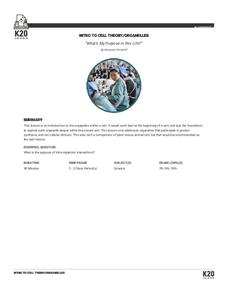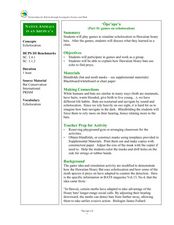National Science Teachers Association
Hop into Action
Young scientists find out what makes amphibians such unique and interesting animals in this simple life science lesson plan. After looking at pictures and discussing the characteristics of amphibians, learners complete a series of three...
Mascil Project
Molecular Gastronomy - Science in the Kitchen
Some say cooking is an art—and a science! Scholars scope out the savory subject of molecular gastronomy with a series of related activities. The teacher's guide contains printable worksheets and helpful tips for implementing the lesson.
Berkshire Museum
The Three Life-Giving Sisters: Plant Cultivation and Mohican Innovation
Children gain first-hand experience with Native American agriculture while investigating the life cycle of plants with this engaging experiment. Focusing on what the natives called the Three Sisters - corn, beans, and squash - young...
Journey Through the Universe
Where to Look For Life?
Every year we discover new planets including more than 1,000 in 2016 alone. Will we ever find life on another planet? The lesson plan includes two activities to help scholars understand this concept. First, they analyze the temperature...
NOAA
Watch the Screen!
Can a sponge cure cancer? Life science pupils visit the drugstore under the sea in the fifth lesson of six. Working groups research the topic then get hands-on experience by testing the inhibiting effects of several plant extracts on E....
American Physiological Society
Sticky Adaptations A Lesson on Natural Selection
Now you see it, now you don't! The stick bug exhibits the ability to disappear into a wooded environment. Why does this adaptation manifest in some species, but not in others? Life science students explore animal adaptations in nature...
Education Outside
Life Cycle of a Sunflower
From a tiny seed needing water and warmth to the bud that will blossom into a flower, elementary pupils illustrate the stages of the sunflower life cycle through dance and drawing.
NOAA
Turning the Tide on Trash: A Learning Guide on Marine Debris
The lessons in this learning guide are designed to increase youngsters' awareness of the impacts of marine debris and to teach them about pollution prevention techniques. This fabulous, 30-page packet is chock full of important...
Curated OER
Turning the Tide on Trash: Marine Debris Curriculum
Seven pages of fascinating reading on marine debris preface the activities in this lesson plan. Four different activities are employed to simulate how the debris is distributed in the ocean and along beaches. Early ecology learners...
NOAA
Deep-Sea Ecosystems – Life is Weird!
A pool of brine in the deep sea can be up to four times as salty as the surrounding sea water. The deep sea ecosystem relies on chemosynthesis and the organisms that live there are often strange to us. The lesson focuses on researching...
Consortium for Ocean Science Exploration and Engagement (COSEE)
Life in an Ocean World
How does the shell color of crabs and the habitat they live in impact the predator-prey relationship? The fourth activity in a series of five is a game where participants try not to get eaten if they are a prey and try to eat if they are...
K20 LEARN
What's My Purpose In This Life? Intro To Cell Theory/Organelles
Why are we here? Well, if you happen to be a Golgi body, the answer is simple! Young biologists embark upon a journey through the tiny world of cellular organelles with an engaging lesson from the K20 Center. The activities open with an...
Journey Through the Universe
Is There Anyone Out There?
What is an alien's favorite game? All-star baseball! Scholars start defining living and non-living. Then, they conduct experiments to research if life exists, keeping in mind that life could be in many forms, not just human.
Berkshire Museum
Adopt a Schoolyard Tree
Help young scientists connect with nature and learn about trees with a fun life science lesson. Heading out into the school yard, children choose a tree to adopt, taking measurements, writing descriptions, and drawing sketches of it in...
Curated OER
Circle of Life
Here is a well-designed science lesson that shows learners that everything that organisms do in ecosystems, including running, breathing, burrowing, growing, requires energy. After a thorough discussion of their own eating and drinking...
Merlyn Education and Climate Protection Project
Short Story Lesson Plan: "Ghostwriter" By Kyle Downey
Frankenstein, Mr. Data, Hal, and DEFCON, the computer featured in Kyle Downey’s tale, “Ghostwriter,” all illustrate the dangers of creating intelligent life. After reading Downey’s story, class members craft their own narrative in which...
Workforce Solutions
Workforce Solutions Pre-K Lessons
Four lessons, each following the same routine, explore the careers of a teacher, nurse, electrician, geologist, plumber, and police officer. After listening to a read-aloud and thoughtful discussion, young scholars construct puppets on...
NOAA
What Little Herc Saw
See the underwater world through a different pair of eyes! Middle school marine biologists identify deep-sea organisms by examining images taken by an ROV from the Okeanos Explorer. After determining what creatures lie beneath the...
Curated OER
Games on Echolocation
Get a little batty with life science! This fun simulation game replicates how bats use echolocation to hunt moths in their native Hawaiian habitat. After creating blind folds and discussing some basic principles of echolocation, students...
Sea World
Ocean Discovery
Immerse your young marine biologists in the world of marine animals. The lesson includes several activities that are age-appropriate for preschoolers and kindergartners, including coloring pages, gluing feathers and sand onto paper...
Berkshire Museum
Meet a Naturalist: Researching, Writing, Interviewing
Young scholars reach out into the community and learn about different environmental science careers in this inquiry-based instructional activity. Beginning with a short research assignment, children gain background knowledge about...
Curated OER
Butterfly Life Cycle
Focused little scientists will flitter their arms back and forth across the room with excitement as they learn the life cycle of a butterfly and how living things grow and change over time.
NOAA
What's the Big Deal?
Who knew that a possible answer to Earth's energy resource problems was lurking deep beneath the ocean's surface? Part four of a six-part series introduces Earth Science pupils to methane hydrate, a waste product of methanogens. After...
Curated OER
WET Science Lesson #3: Comparison of Aquatic and Terrestrial Plants
Elementary life science explorers compare and contrast aquatic and terrestrial plants (elodea and soybeans) in a Venn diagram. Some background information is provided to support direct instruction, and general instructions are provided...

























